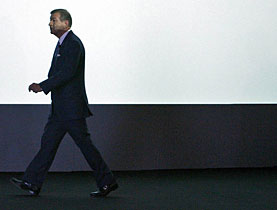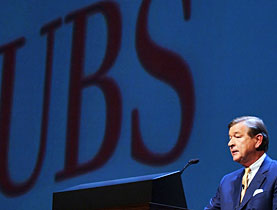A top banker falls

The man who made billions of francs for UBS, Switzerland's biggest bank, announced on Tuesday that he was stepping down as chairman.
Marcel Ospel had been described as the bank’s biggest liability after the huge losses it incurred over the US subprime crisis. It has written down SFr40 billion (just over $40.2 billion), and further losses are possible.
Ospel is being seen as largely responsible for the debacle. And the qualities which enabled him to make UBS one of the world’s leading banks are not so very different from the faults which have brought him down.
“Marcel Ospel played a decisive part in the expansion and success of UBS,” Martin Spieler, editor in chief of the Handelszeitung business magazine told swissinfo.
“His great tragedy is that he missed the right time to leave.”
Spieler says that by trying to sit out the crisis, Ospel made himself part of the problem.
High risks for high returns
UBS owed much of its success in climbing to the top to Ospel’s “gut feeling for good business,” Spieler says. He had constantly raised the bank’s profitability and in particular the return on equity.
Furthermore, Ospel was largely responsible for the good global positioning of the bank, especially on the Asian market.
Spieler sees Ospel’s problem in being that he remained a “stock market trader and investment banker” even when he became the bank’s chairman. He took risks in chasing after the highest rates of return on equity.
Although Ospel was far from alone in pursuing such a policy, most rivals gave up earlier. “UBS stayed too long at the party,” says Spieler, and has woken up with a terrible hangover.
Ospel is not to seek re-election when UBS shareholders meet on April 23. It is a far cry from the time only two years ago when he was awarded a SFr26 million salary as a reward for the billions the bank had made in profits – a deal which earned him much public criticism at the time.
In November 2007 for the first time Ospel made it into the annual list of the 300 richest people in Switzerland published by Bilanz magazine.
Ospel the man
Ospel has been described as “single-minded, power-conscious and ambitious”, with “peasant cunning and antennae finely attuned for opportunities and dangers.”
He is known as an enthusiastic participant in the carnival in his hometown, Basel, where he is a drummer in one of the so-called cliques which don a disguise and play music in the streets at carnival time.
Even so, Spieler thinks that Ospel lacks the common touch. “In the last few years he has withdrawn more and more into himself. It has become harder and harder to reach him,” he commented.
And this has played its part in his downfall, Spieler believes. “Ospel had lost the confidence of his colleagues, share holders and the public at large and could no longer convey his messages.”
swissinfo, based on an article in German by Renat Künzi
He was born in Basel in 1950.
He entered the Swiss Bank Corporation (SBC) in 1977, and apart from three years at Merrill Lynch spent his entire career there.
He worked his way up, joining the board of management in 1990.
Ospel was the architect of the merger of the SBC and the Union Bank of Switzerland in 1998.
Until 2001 he was the CEO of the newly formed UBS, and since then has been chairman of the board of directors. On 1st April 2008 he announced that he would step down on 23rd April.
Ospel came under pressure in the wake of the collapse of Swissair in 2001. Critics claimed that the grounding could have been avoided if Ospel could have been contacted and money transferred to the airline’s empty coffers.

In compliance with the JTI standards
More: SWI swissinfo.ch certified by the Journalism Trust Initiative











You can find an overview of ongoing debates with our journalists here . Please join us!
If you want to start a conversation about a topic raised in this article or want to report factual errors, email us at english@swissinfo.ch.